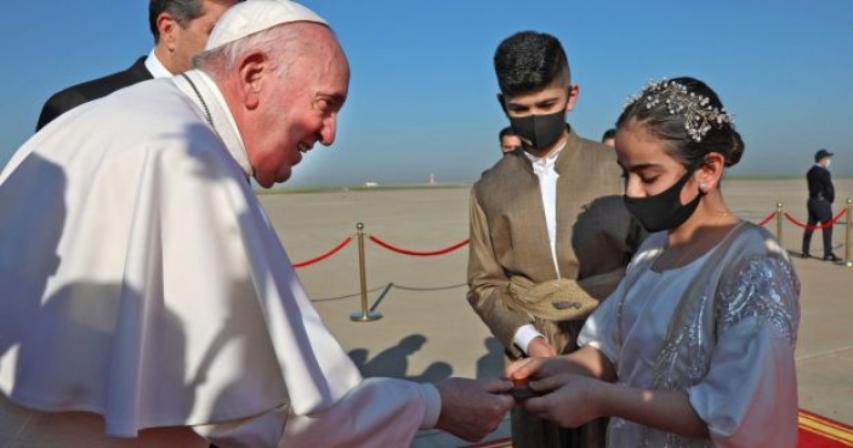Pope Francis visits regions of Iraq once held by Islamic State
- 4 years ago

Pope Francis is visiting parts of northern Iraq that were held by Islamic State (IS) militants on the third day of his historic trip to the country.
IS seized the region in 2014, targeting Christians and other minorities. Christians have been returning since IS was defeated in 2017.
Later on Sunday the Pope will celebrate Mass at a football stadium in Irbil, with up to 10,000 attendees expected.
There are fears the ritual could become a coronavirus super-spreader event.
Iraq has seen a sharp rise in Covid-19 infections over the past month.
The 84-year-old leader of the Catholic Church and his entourage have all been vaccinated, but Iraq only received its first batch of doses last week.
The four-day trip, which began on Friday, is the pontiff's first international excursion since the start of the pandemic more than a year ago, and the first ever papal visit to the country.
Some Shia Muslim militant groups have reportedly opposed the visit, suggesting the tour amounts to Western interference in the country's affairs.
Early on Sunday, the Pope was welcomed as he arrived in the northern city of Irbil by the head of Iraq's Kurdistan region, Nechirvan Barzani.
Later, the pontiff is due to travel to Mosul - a former IS stronghold for three years - where he will say prayers in Church Square for the victims of the war with the Sunni Muslim militant group, which left tens of thousands of civilians dead.
He will then visit Iraq's largest church, which was partly destroyed by IS, in nearby Qaraqosh, where Christians have returned since the group's defeat.
About 10,000 Iraqi Security Forces personnel have been deployed to protect the Pope during his visit, while round-the-clock curfews have also been imposed to limit the spread of Covid.
What message is the Pope delivering?
Since arriving in Baghdad on Friday, Pope Francis has called for an end to violence and extremism and said that Iraq's dwindling Christian community should have a more prominent role as citizens with full rights, freedoms and responsibilities.
"The age-old presence of Christians in this land, and their contributions to the life of the nation, constitute a rich heritage that they wish to continue to place at the service of all," he said in his first speech in the country.
On Saturday, in a highly symbolic meeting with the Grand Ayatollah Ali al-Sistani in the holy city of Najaf, the Pope echoed this message, saying that Christians should be able to live in peace and security like all other Iraqis.
Audiences with the reclusive 90-year-old spiritual leader of millions of Shia Muslims are rare, but he received the Pope for around 50 minutes, the pair talking without face masks.
The Pope then visited the site of the ancient city of Ur, believed to be the birthplace of the Prophet Abraham, who is revered in Judaism, Christianity and Islam.
In a message delivered there, he said: "We believers cannot be silent when terrorism abuses religion... let us not allow the light of heaven to be overshadowed by the clouds of hatred."
Iraq has been wracked by religious and sectarian violence, both against minorities and between Shia and Sunni Muslims too.
How vulnerable are Iraq's Christians?
One of the world's oldest Christian communities has seen its numbers plummet over the last two decades from 1.4 million to about 250,000, less than 1% of the country's population.
Many have fled abroad to escape the violence that has plagued the country since the US-led invasion in 2003 that ousted Saddam Hussein.
Tens of thousands were also displaced when militants from the Sunni Muslim Islamic State (IS) group overran northern Iraq in 2014, destroying their historic churches, seizing their property, and giving them the choice to pay a tax, convert, leave or face death.
A US state department report on religious freedom in Iraq in 2019 found that Christians, as well as Sunni Muslims, complained of harassment at checkpoints by Shia security forces and some discrimination in education.
On his arrival on Friday, the Pope said Iraq's Christian community should have a more prominent role as citizens with full rights, freedoms, and responsibilities.
Who are Iraq's Christians?
• People in what is now Iraq embraced Christianity in the 1st Century AD
• According to the US state department, Christian leaders estimate there are fewer than 250,000 Christians remaining in Iraq, with the largest population - at least 200,000 - living in the Nineveh Plain and Kurdistan Region in the north of the country
• Approximately 67% of those are Chaldean Catholics, whose Eastern-rite Church retains its own liturgy and traditions but recognises the authority of the pope in Rome. Another 20% are members of the Assyrian Church of the East, believed to be the oldest in Iraq
• The rest are Syriac Orthodox, Syriac Catholic, Armenian Catholic, Armenian Apostolic, as well as Anglican, Evangelical and other Protestants.
Source: BBC
Comments